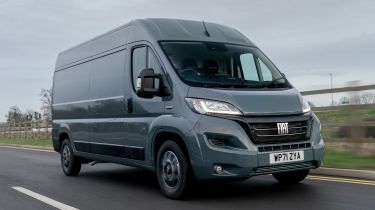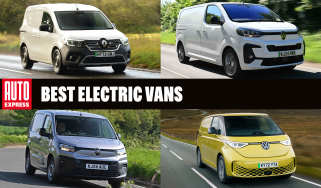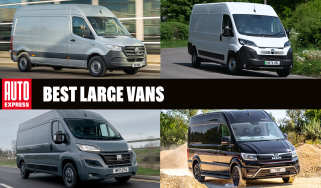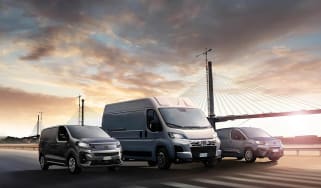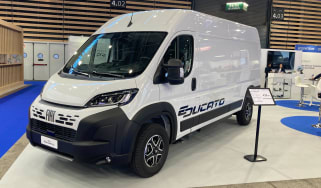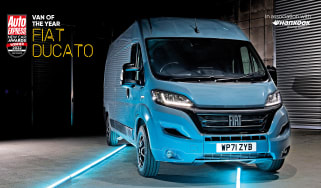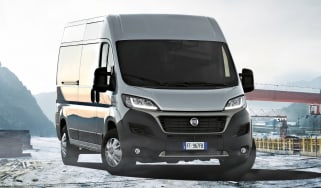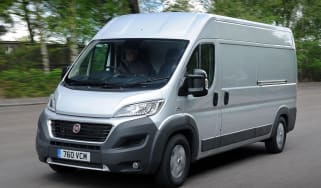Fiat Ducato van review
The Fiat Ducato is available in many body styles and has loads of cargo space
Our opinion on the Fiat Ducato
The Fiat Ducato has long been a popular choice in the large van sector, selling in big numbers across Europe in many shapes and sizes, whether it's a traditional panel van, chassis cab or even as a popular base for a campervan. The diesel models in the latest version are - as always - noisy but punchy, but the electric version is more refined while still being a rugged workhorse.
The wide array of body styles is the van’s biggest plus point compared to rivals, since there’s sure to be a version that suits your needs, from simple load-carrying to camping or towing.
About the Fiat Ducato
The Fiat Ducato is a large panel van from Stellantis, and shares a large amount of parts with several other vans from the group including the Peugeot Boxer, Citroen Relay, Vauxhall Movano, US-market Ram ProMaster and the Toyota ProAce Max. The latest versions of each are even more similar than before, and the electric versions are all based on the same tech just like the diesel versions.
The most recent facelift brought new front-end looks to all of the sibling vans, and the Ducato gets an interesting grille with a large Fiat badge. It helps to make the van look more modern, and there’s more tech available now, but the base of the van is still just like before; spot one from behind and you’d be hard-pressed to notice a difference post-facelift.
Used - available now

2021 Renault
Captur
63,019 milesManualPetrol1.0L
Cash £11,999
2019 Volvo
XC40
70,408 milesManualPetrol1.5L
Cash £13,800
2022 Renault
Captur
10,105 milesAutomaticPetrol1.6L
Cash £17,349
2024 Jaguar
F-Type Convertible
4,483 milesAutomaticPetrol5.0L
Cash £59,995The Ducato starts at around £33,000 for the normal panel van model (the chassis cab and other niche variants cost a bit less as they are sold for conversion). There are three lengths (L2, L3 and L4) and three roof heights (H1, H2 and H3) to choose from in various combinations. Some versions are so large and heavy you will need either a pre-1997 driving licence or a C1 commercial vehicle permission on your licence to drive them.
There are also Window Van models for carrying passengers, plus Chassis Cab, Chassis Crew Cab, Platform Cab, Dropside Cab, Tipper Cab and Back-to-Back models, so there should be a version of the Ducato to suit any business.
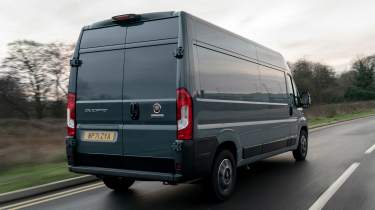
Two 2.2-litre four-cylinder diesel engines are available: a 138bhp unit with a six-speed manual gearbox or an eight-speed automatic, or a 178bhp version of the same unit with the eight-speed auto as standard. Both use front-wheel drive only.
The electric E-Ducato uses a 110kWh battery and a 268bhp electric motor powering the front wheels. There are fewer body styles to choose from in the E-Ducato range, as you can only get it in L3H2, L3H3, L4H2 and L4H3 sizes, a single Window Van and an L3H1 Chassis Cab. Prices for the E-Ducato panel van start at £46,000.
There are two trim levels, the base model (just called Ducato) and the Primo. Standard kit includes:
- Air conditioning
- Rear parking sensors
- Cruise control
- Electric twin door mirrors
- Twin rear doors.
- Single nearside sliding door
- Five-inch DAB radio touchscreen with Bluetooth,
E-Ducato models come with a larger seven-inch touchscreen set-up with smartphone connectivity and a seven-inch digital instrument display.
The Primo model add the following to the base spec:
- Keyless entry and go
- Climate control
- All-round parking sensors
- Blind spot assist
- A rear-view camera
- Upgraded interior trim
- Ten-inch infotainment screen with sat-nav and smartphone connectivity
- Wireless charging point
MPG and running costs
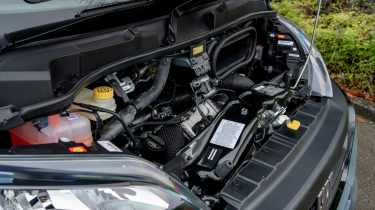
Pros |
Cons |
|
|
Prices for the Ducato panel van start at around £33,000 for the manual 138bhp diesel, and you’ll pay about £2,000 to get the same engine with an automatic gearbox depending on your body style choice.
You’ll need to add around £800 to move up the steps from the L2H1 van up to L2H2, L3H2 and L3H3. These are the ‘light’ models, but there are also ‘Maxi’ versions with reinforced rear suspension that start at around £35,000 for a L3H2 model. There are also L4H2 and L4H3 Maxi versions above that.
The electric E-Ducato starts from around £46,000 and comes in L3H2, L3H3, L4H2 and L4H3 panel van guises, plus as an L4H2 Window Van and an L3H1 Chassis Cab.
On the options list there’s a Worksite Heavy pack that adds mud & snow tyres, beefier double-leaf rear suspension, a spare wheel and wheelarch mouldings for £770, while a range of other packs can be used to upgrade the cabin upholstery and enhance the tech on board, adding kit such as alloy wheels, front & rear parking sensors, LED headlights and extra safety kit.
Official fuel economy figures for the diesel vary quite a bit depending on the variant you choose, but generally the autos are worse than manual models for efficiency. Highs of 44mpg can be expected from smaller versions, dropping to around 37mpg in larger models. The lows - the figures you can expect around town and in more demanding situations - start at just over 20mpg and rise to 31mpg in the most economical models.
Electric range, battery life and charge time
The electric E-Ducato has a range of up to 263 miles, although some models are only capable of 235 miles according to official figures. As with the diesel models, it all depends on the body style you choose and your driving style (lower speeds will result in better efficiency).
The battery has a total capacity of 110kWh, of which 97.8kWh is usable. You can charge up at a maximum of 150kW, which allows for a five to 80 per cent charge in 55 minutes, which is good for long trips. Normal 7.4kW single-phase charging will take about 17 hours to recharge the van fully.
Load space and practicality
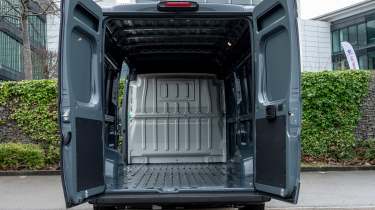
Pros |
Cons |
|
|
There’s loads of space inside the Fiat Ducato panel van but the wide array of styles means even this is highly variable. It starts at 10 cubic metres for the L2H1 van, rising to 11.5 cubic metres in the L2H2, 13 cubic metres in the L3H2, 15 cubic metres in the L3H3 and L4H2, and 17 cubic metres in the L4H3.
That compares favourably with the Ford Transit, which has a maximum cargo volume of 15.1 cubic metres, although the Mercedes Sprinter matches the Fiat’s 17 cubic metres. Of course the other Stellantis vans like the Citroen Relay have the same volume too.
The L2 model has a wheelbase of 3,450mm and the L3 and L4 models have a 4,035mm measurement since the larger of those has a longer bay behind the rear wheels rather than extra space between the axles. It’s 6,363mm long overall, while the L2 is 5,413mm and the L3 is 5,998mm.
The shortest roof height, H1, is 2,254mm high, and that increases to 2,522mm in the H2 and 2,760mm in the H3. All models are 2,050mm wide (without the mirrors), and the longer vans will feel very large in city centres. While the cargo floor is quite high up, once you are inside the H2 and H3 models are tall enough for almost anyone to stand up straight, which is useful when you’re loading up a lot of cargo (not having to hunch inside makes a big difference).
There are two gross weights, 3.5 and 4.25 tonnes, so payloads are generally good (roughly one to two tonnes in the diesel models) but the electric version does have to carry batteries all the time and this reduces its payload to a maximum of 710kg in some versions. The 4.25-tonne versions with beefier suspension can haul up to 1,460kg though.
You can carry 2,400kg in the E-Ducato and a tow hook is £500 on the options list.
Reliability, safety and security
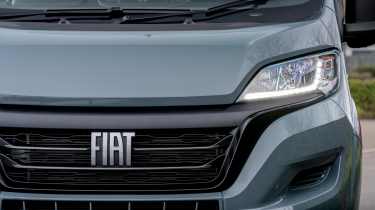
Pros |
Cons |
|
|
The Ducato comes with an airbag for the driver and both passenger seats up front, which is reassuring for everyone on board. Autonomous emergency braking with pedestrian and cyclist detection helps to keep everyone around you safe in city driving, especially as visibility isn’t that great around the A-pillars. At least the mirrors are huge and provide a good view backwards and other safety tech such as traffic sign recognition and lane-keeping assist are standard.
The Ducato and its sibling vans scored highly in their Euro NCAP test, with a five-star overall rating and a 78 per cent score for safe driving, a 64 per cent score for tech, and an 80 per cent score for post-crash safety.
While parking sensors are standard, you need to pay extra (or move up to the Primo trim level) to get a reversing camera. This is a really useful bit of kit on such a large van with limited visibility of the rear, so it’s a recommended addition to avoid back-bumper scrapes. You get an alarm as standard and a remote central locking system that can open the cab or load bay separately, plus deadlocks are included too.
Since the Ducato uses engines and drivetrains shared with a huge number of other vans from Peugeot, Vauxhall, Citroen and more, issues with reliability should be few and far between. The diesels have been in use without major issue for a long time now, and the electric versions have little mechanical to go wrong in the first place.
You get a normal three-year or 100,000-mile warranty, and the electric model has an additional battery warranty for up to eight years and covers for loss of capacity up to 70 per cent.
Driving and performance
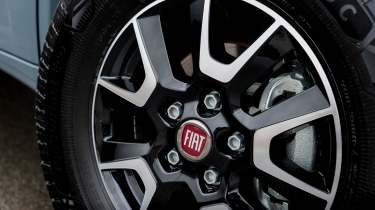
Pros |
Cons |
|
|
The Fiat Ducato has been on sale in its current form for a long time if you don’t count the facelifts it’s had over the years. This means it feels older than it looks to drive, especially when it comes to comfort and refinement.
Drive without a significant load in the cargo bay and it’s very bouncy and uncomfortable on uneven roads, although the heavier E-Ducato doesn’t suffer as badly. It’s also pretty noisy in the cabin, as there’s a lot of road and wind noise transmitted straight into the cabin.
There are some issues with visibility around the A-pillars but there are big mirrors at each side that give a good view of the rest of the van, so it’s not as intimidating to drive as it might seem at first. It’s still a very large van, though, especially the longer and higher variants, so might not be suitable for town and city driving.
The 2.2-litre diesel engine is pretty noisy and feels like a bit of a throwback to when vans were universally loud and rattly - but these days there are rivals with quieter, smoother diesel engines. The E-Ducato makes the diesel feel especially unpleasant, as it’s so smooth and quiet at low speeds.
The diesel is still pretty punchy and has good performance in both 138bhp and 178bhp guises. The automatic gearbox is a good one, so it’s worth the extra cash, as the manual only adds to the agricultural feel of the base model.
The E-Ducato’s electric motor packs is punchier still and gets off the line very smartly. Since it uses a single-speed auto gearbox it’s really easy to drive as well, so it’s the best van in the range for driver comfort and enjoyment.
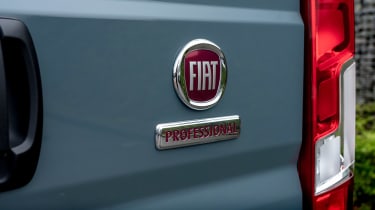
Town driving, visibility and parking
Since the Ducato is over two metres wide, it’ll be a pain to avoid width restrictors and car parks, so you’ll need to make sure your cargo isn’t better suited to a smaller van. Larger panel vans can be a bit too much for the UK’s medieval city streets, which is something to be aware of.
If you plan to drive in town then a reversing camera (an optional extra) is our recommendation, as it will help you keep an eye on the back bumper in crucial situations. The best version for town use is the E-Ducato, which is easier and more efficient to drive at lower speeds and in traffic.
Motorway driving and long-distance comfort
Without a heavy load in the back - which the suspension is designed to deal with - the Ducato feels bouncy and unpleasant on the motorway. The long wheelbase means it’s not back-breaking, but it’s noticeable. There’s also a lot of wind and road noise in the cabin so longer trips are hardly the van’s strong point.
The E-Ducato is a lot better when it comes to refinement at speed but there’s a trade-off as the electric motor will use quite a lot more power at speed, so your expected range will drop off quicker and you’ll have to stop more often to recharge.
Cab interior and technology
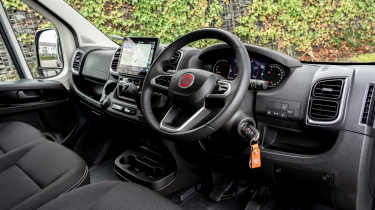
Pros |
Cons |
|
|
The high-set cab is quite a big step up to access, but there are grab handles to help you climb aboard. The driving position behind the wheel can be a little cramped for some, because the Ducato is designed to carry cargo rather than people, so the cab is pushed forward as far as possible, which can make legroom tight behind the wheel.
It’s only a big issue for the tallest drivers but still worth test driving before you buy, in case you find it too uncomfortable for daily use. There’s plenty of space in the cabin for passengers, as the cabin is really wide and the seats are designed to accommodate three people up front nicely. Headroom is plentiful as well.
Storage is great. There are big door bins and plenty of dashtop storage, while the passenger seats flip up to reveal more hidden storage beneath and the glovebox is really big. There are plenty of hard-wearing plastics in the cab that should hold up well but they do look a bit dated.
You might expect overhead storage in the higher-roof models but since that space is added to the cargo bay, there’s actually less storage space up there in the cabin.
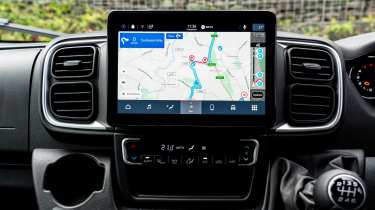
Infotainment, sat-nav and stereo
You get a five-inch DAB radio touchscreen included on all models, or there’s a seven-inch unit on the E-Ducato. A ten-inch screen is available on the Primo spec or via the options list, and the larger screens come with smartphone connectivity and sat-nav. It’s a nice-looking, modern screen with shortcut buttons along the bottom.
There are steering wheel controls for some functions but there’s a lot you can fiddle with on the screen that can get distracting while driving. Sat-nav with traffic updates is available but many will prefer Apple CarPlay or Android Auto and you can charge up wirelessly on Primo models or via USB elsewhere. A digital dash is included on electric models as well, which helps to make the cabin feel more modern and it’s useful for checking range and charging quickly.
Buying and owning
The diesel model will be the default choice for most, as it brings good fuel economy and the flexibility for long trips without stopping for long periods. The automatic model costs a bit more to buy but we reckon it’s worth going for as it makes the van a lot easier and more relaxing to drive.
The E-Ducato electric van is great for shorter trips and local usage, but the higher purchase price will mean it remains a bit more of a niche for now. Lower running costs over a longer period may mean it works for you, though, so definitely do your sums before buying.
Alternatives
The immediate rivals for the Ducato are the Peugeot Boxer, Vauxhall Movano, Citroen Relay and Toyota Proace Max. These are all essentially the same van and have virtually identical stats, although the Toyota comes with a better warranty (but is sold in fewer variants).
Rivals from other makers include the Volkswagen Crafter and MAN TGE, or the Mercedes Sprinter. These vans are more refined and upmarket than the Stellantis models. The Ford Transit and E-Transit are excellent panel vans too and well worth a look.
We reckon the best van in this class at the moment is the Renault Master. Although it doesn’t have as many variants as the Ducato, it’s far more refined and should have lower running costs as well.
Van dimensions | |||
| Body style | Height | Width | Length |
| Ducato L2H1 | 2,254mm | 2,050mm | 5,413mm |
| Ducato L2H2 | 2,522mm | 2,050mm | 5,413mm |
| Ducato L3H2 | 2,522mm | 2,050mm | 5,998mm |
| Ducato L3H3 | 2,760mm | 2,050mm | 5,998mm |
| Ducato L4H2 | 2,522mm | 2,050mm | 6,363mm |
| Ducato L4H3 | 2,760mm | 2,050mm | 6,363mm |
Load area dimensions | ||||
| Body style | Height | Width | Length | Volume |
| Ducato L2H1 | 1,662mm | 1,870mm | 3,120mm | 10m3 |
| Ducato L2H2 | 1,932mm | 1,870mm | 3,120mm | 11.5m3 |
| Ducato L3H2 | 1,932mm | 1,870mm | 3,705mm | 13m3 |
| Ducato L3H3 | 2,172mm | 1,870mm | 3,705mm | 15m3 |
| Ducato L4H2 | 1,932mm | 1,870mm | 4,070mm | 15m3 |
| Ducato L4H3 | 2,172mm | 1,870mm | 4,070mm | 17m3 |
Frequently Asked Questions
While the Fiat Ducato isn’t the best van in its class, it’s not bad and there are so many variants that it could be the best model for you, depending on your specific application.

